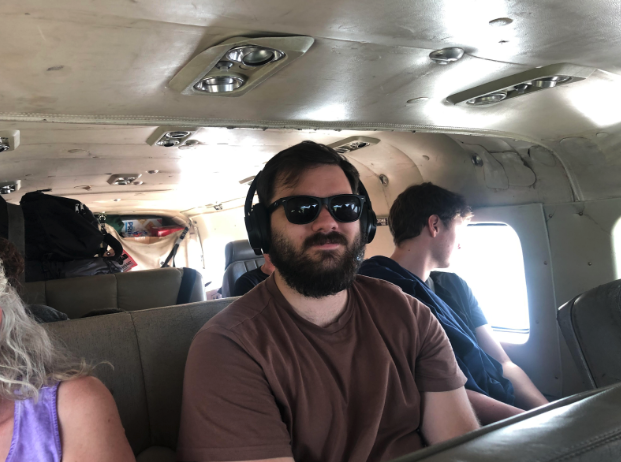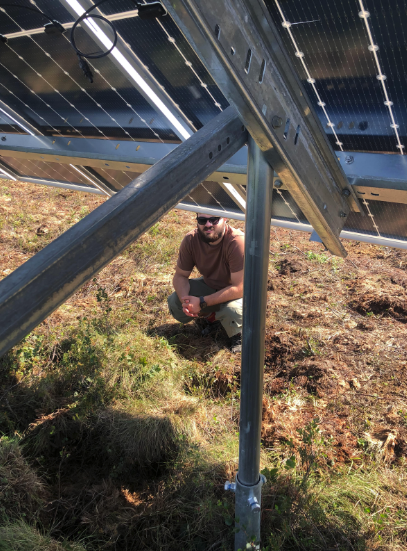Internship brings about renewable energy enthusiasm
August 24, 2023

Cameron Dolan waits to get off the plane in Galena.
This article is part of a series highlighting ACEP’s 2023 cohort of eighteen undergraduate interns. To read about other projects and learn more about the program, please visit the ACEP Internship Program website.
Computer science major at the University of Alaska Anchorage, Cameron Dolan spent this summer as an ACEP intern under the guidance of Michelle Wilber. He worked on projects to assist the Municipality of Anchorage (MOA) in determining the feasibility of integrating electric garbage trucks. He examined the data from an electric box truck in a project funded by the Department of Energy.
Garbage trucks are some of the least efficient utility vehicles and can be costly due to the amount of fuel they require, especially during the colder winter months. This is one of the unique challenges that Alaska faces. Dolan’s work on the box truck aims to prove that using electric garbage trucks can be both economically and environmentally beneficial to the MOA.
Dolan also assisted Wilber and a team of researchers from the Alaska Native Tribal Health Consortium and Analysis North in modeling a representative Alaska microgrid to find the most cost effective ways to use or store the excess power from integrating large amounts of wind.
In addition, Dolan participated in a small project to test an animal tracker on the truck of a willing participant in Galena. If the test is successful, they hope to install these trackers on other vehicles to examine the driving habits of willing residents to determine the feasibility of implementing electric vehicles, or EVs, into the community. This work is part of the Electric Vehicles in the Arctic (EVITA) project funded by the National Science Foundation.

Cameron Dolan joined Michelle Wilber at the Galena pilot solar array
Dolan wants his work to contribute to a future where Alaska uses clean energy and EVs in a way that works for the residents of “this beautiful state,” where he grew up.
“Implementing EVs in a rural setting is very different from implementing them in an urban setting. Some rural communities don’t have paved roads, which could damage EVs. Some communities might not have the grid capacity to charge them,” explained Dolan.
“Through this work we hope to learn more about the Alaskans that live in these communities — how they feel about renewable energy and EVs, how it could be beneficial or possibly be detrimental to them.”
Dolan feels that his internship taught him and improved a wide range of skills — from technical skills related to his field of work and study, his coding skills, and general job skills such as writing professional emails, to personal and communication skills. He finds that he has become more confident in his work.
He finished his internship as a renewable energy enthusiast.
“My perspective on renewable energies has greatly changed and I have an even greater appreciation and interest in them. I’m considering taking my career further into renewable energy!”
This internship is funded by the Office of Naval Research through the ACEP Undergraduate Summer Internship program. View the final presentation for this project on ACEP’s YouTube Channel. For more information on this project, please contact Michelle Wilber at mmwilber@alaska.edu.


